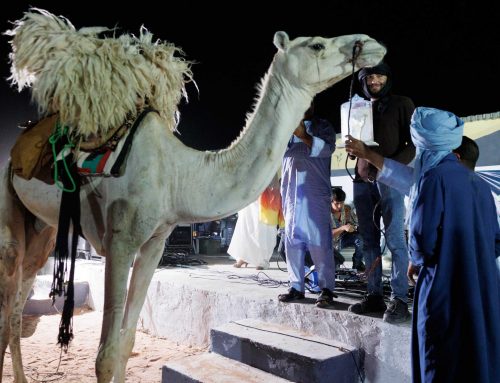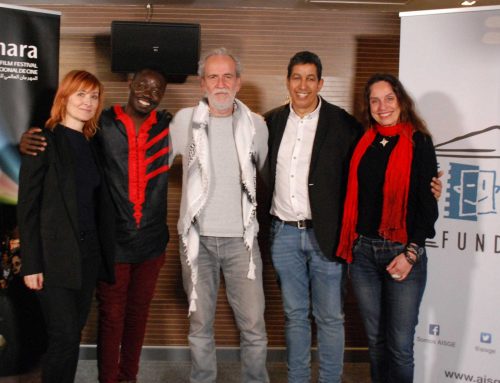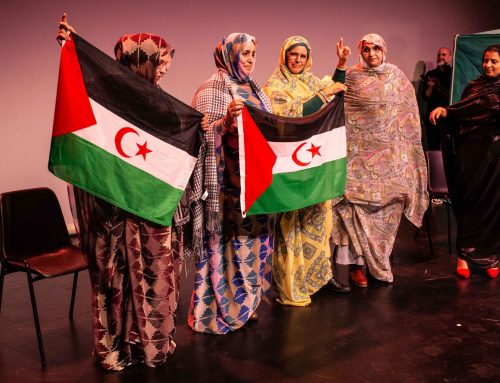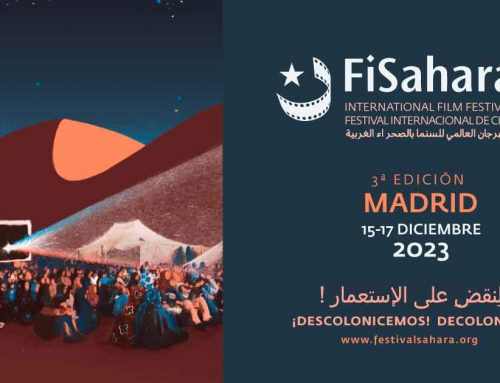With the same unyielding spirit of the people that makes it possible, the 18th edition of FiSahara (International Film Festival of Western Sahara) has kicked off tonight with with the participation of three young Sahrawis who have staged this year’s theme: Jaimitna Fi Cinema (Our haima in the cinema): To Resist is to Win. Recalling the words of the initiator of the invasion of Western Sahara, Hassan II, when he stated, “we have occupied territories, but we have not occupied hearts,” the youth have claimed, “cinema as a window to the elements that shape our culture.”
The wilaya (camp) of Ausserd, a refugee population camp, will host from today until May 5th more than thirty international media outlets, as well as members of the public, human rights activists, and artists from four continents (Europe, Africa, America, and Asia) around the tribute to all those struggles of resistance of the peoples turned into victory. The Minister of Culture of the Sahrawi Arab Democratic Republic (SADR), Moussa Salma, has defended the “culture of peace and spaces like FiSahara that represent a cry for peace in the midst of this limbo of wars, discrimination, and racism.”
At the presentation of the screening of Unsubmissive, which highlights the resistance of Sahrawi women activists in the territories illegally occupied by Morocco, several activists who risk their lives every day, such as Elghalia Djimi, Mina Baali, Salha Boutenghiza, and Mahfouda Lekfir, among others, have attended. Baali herself, amidst the applause of an engaged audience, emphasized, “this is not individual resistance; it cannot be separated from the Sahrawi people, as it is part of a resilient whole.”
Later, the evening continued with the screening of Calle de la Resistencia, which, in a musical format, narrates the devastation of Puerto Rico after Hurricane Maria and the popular uprisings that forced corrupt governor Ricardo Roselló to resign, the Desert Screen once again illuminated the Algerian hammada. Puerto Rican journalist, musician, and screenwriter Milton Carrero was responsible for presenting the musical of which he is the author, sharing that “I come from the Caribbean with Puerto Rico in my heart, and I come to tell you that I recognize your culture, admire it, and respect it.”
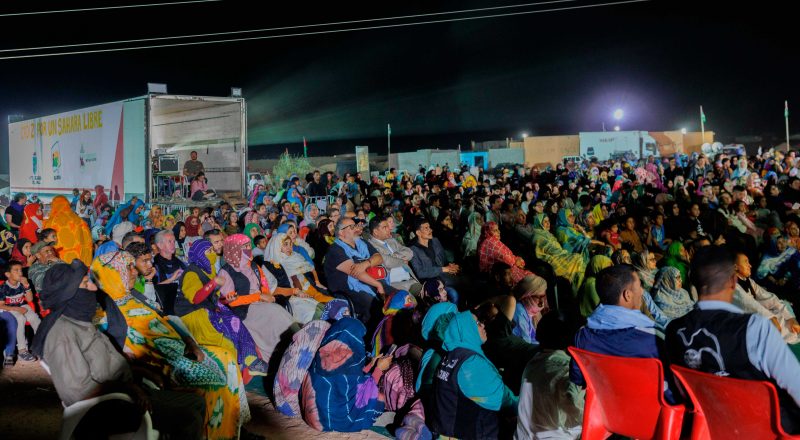
The Desert Screen. – Sergio R. Moreno
In a predominantly international edition that advocates for the unity of peoples against the oppression and impunity of occupying forces, the attending audience has enjoyed the award-winning film Jaima, a movie born from the collaboration between the Abidin Kaid Saleh Audiovisual Training School, established by FiSahara in 2011, and the International Academy of Audiovisual Sciences (CISA) in Locarno.
The film festival on cinema and human rights, which swaps the red carpet for the haima carpet, closed the evening with the screening of Hassna, by Algerian director Khaled Habib El Kebich. The film narrates the determination of the Algerian people in the face of the atrocities committed by the French army during the occupation of the region by France.
Thus, FiSahara has kicked off a week of culture and human rights advocacy, featuring roundtable discussions on climate emergency, the resistance of Sahrawi women, and the struggle of peoples in countries such as Colombia, Puerto Rico, Palestine, or East Timor. The event will include the participation of international figures such as Soraya Bayuelo, National Peace Prize laureate and founder of the Montes de María Audiovisual Festival (Colombia) and a participant in the third Delegation of the 60 Victims who attended the Peace Talks in Havana (Cuba); Lurdes Pires, filmmaker and key Timorese activist in the independence process of East Timor; Senegalese actor and artivist Thimbo Samb, who uses cinema and theater to raise awareness about racism in Spanish society; and Ahmad Al-Bazz, a Palestinian photographer, filmmaker, and journalist from the West Bank, producer of 200 Meters, which will be presented at this edition of FiSahara.
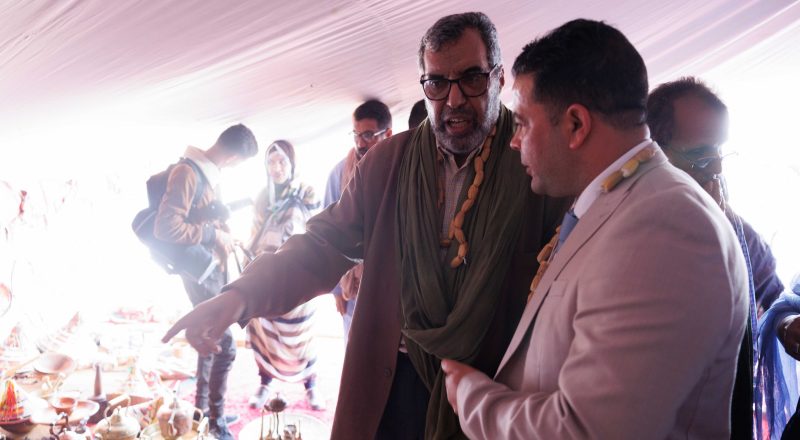
SADR Prime Minister Bucharaya Beyun inaugurates LeFrig. – Sergio R. Moreno
Culture as Identity
Likewise, today LeFrig has been inaugurated, the traditional camp led by women showcasing Sahrawi customs and traditions with typical food, clothing fabrication, music and dances, traditional games, where different Sahrawi wilayas compete to best embody Sahrawi tradition as another resistance struggle against the Moroccan genocide attempt.
In this same vein, the tent (jaima) occupies a central place in this edition, as highlighted by the governor of Ausserd, Jira Bulahi, emphasizing that “the haima showcases part of our identity, the same one that the Moroccan regime has tried to destroy by prohibiting its erection in the Occupied Sahara.”
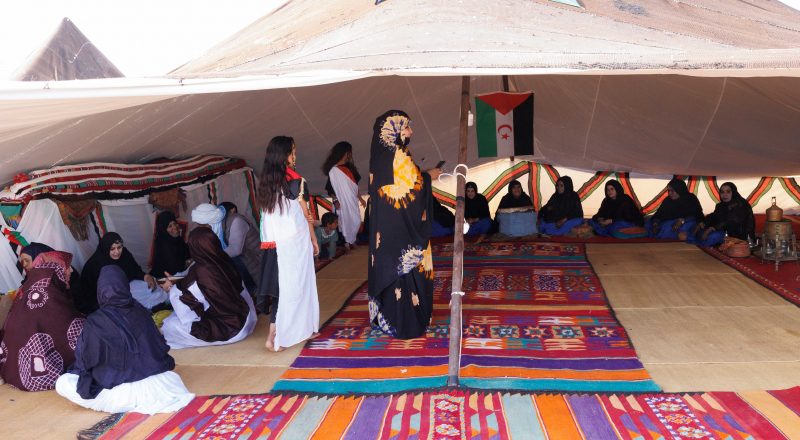
LeFrig Openning. – Sergio R. Moreno
In this same vein, the tent occupies a central place in this edition, with this cultural representation and the Jaimitna project, a traveling, multimedia, feminist, and decolonized initiative born from the collaboration between FiSahara, the Norwegian Committee of Support to Western Sahara, and a collective of Sahrawi women activists, as well as artists, architects, journalists, and filmmakers. Jaimitna is a tent woven inside with the 19 melfas (Sahrawi women’s dress) of human rights defenders in occupied Western Sahara, with QR codes containing the 19 stories, narrated through personal interviews with Sahrawi journalist Asria Mohamed, creator of Jaimitna.


